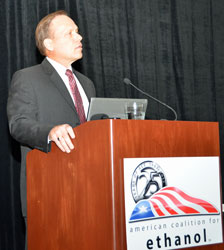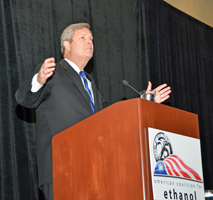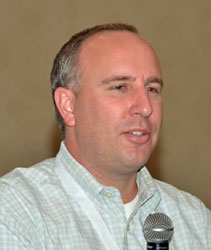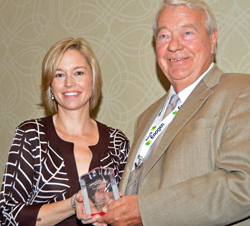Corn growers remain optimistic about the future, despite this year’s drought-devastated crop.
 “It could all change tomorrow,” was the theme of National Corn Growers Association (NCGA) CEO Rick Tolman’s talk at the American Coalition for Ethanol conference in Omaha on Friday, just hours after the USDA released a new crop forecast showing a 13% drop in corn production this year compared to last. “This too shall pass,” said Tolman. “We think the future’s going to be bright still.”
“It could all change tomorrow,” was the theme of National Corn Growers Association (NCGA) CEO Rick Tolman’s talk at the American Coalition for Ethanol conference in Omaha on Friday, just hours after the USDA released a new crop forecast showing a 13% drop in corn production this year compared to last. “This too shall pass,” said Tolman. “We think the future’s going to be bright still.”
“We were hoping for some miracles but they’re not there,” Tolman said in an interview. “It’s one of the worst situations we’ve had in the history of corn production in the United States, but it’s still the eighth largest crop we’ve ever produced.”
NCGA remains committed to maintaining the Renewable Fuel Standard corn ethanol requirement and Tolman said they are working to set the record straight about the RFS and correct misinformation that has been distributed by those who want to waive or dismantle the program. Most important is the inaccurate statement that more corn is used for ethanol than is used for livestock. “That is not true,” said Tolman. “More corn is GROUND for ethanol, but more still is consumed for livestock” when the co-product distillers grains is added to the equation.
Listen to my interview with Tolman at ACE: Interview with NCGA CEO Rick Tolman
Listen to Tolman’s comments at ACE: NCGA CEO Rick Tolman remarks at ACE











